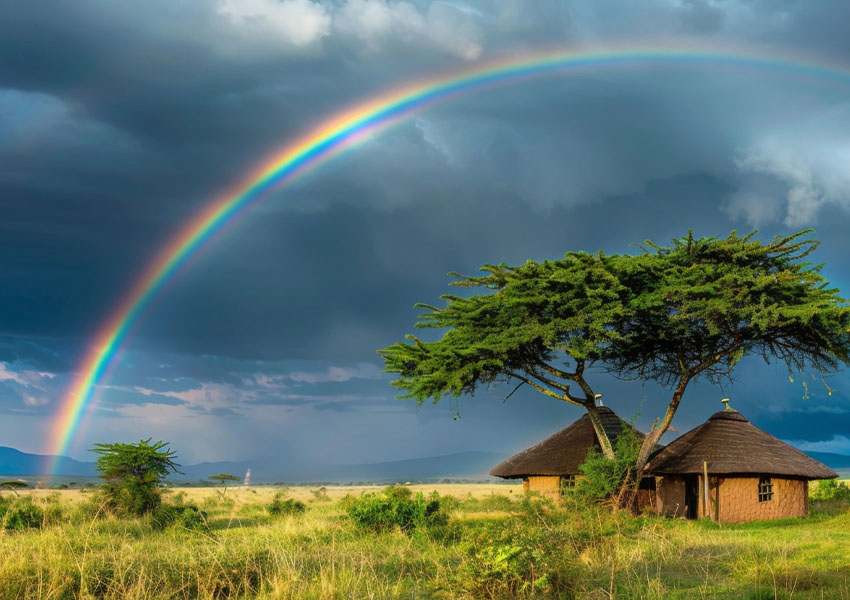

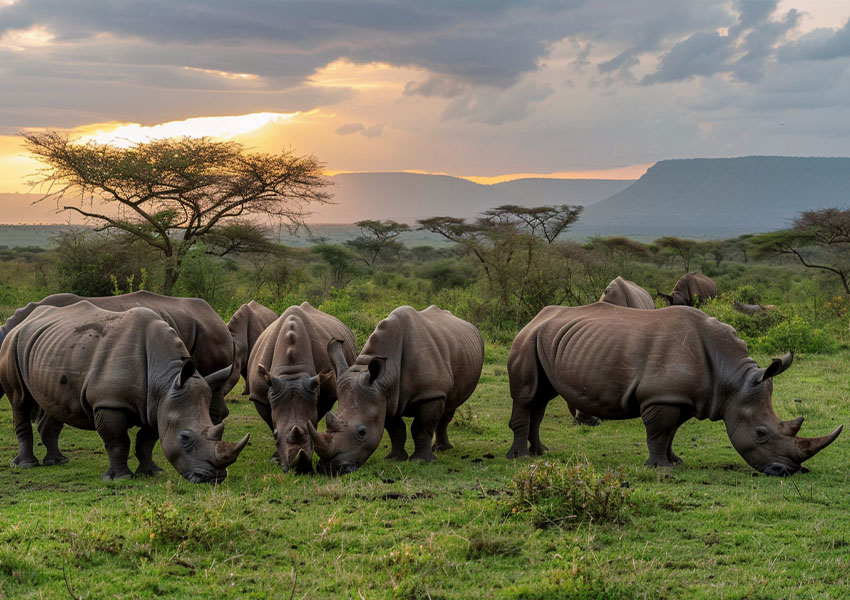
Travel Tanzania is an exciting journey filled with rich culture and stunning nature. When you tell friends you’re going to Tanzania, you might hear mixed opinions. Some may say it’s a land of incredible wildlife and friendly people, while others might warn you about safety. So, what’s the real story? In page, we will explore Tanzania’s history and attractions, helping you understand this beautiful country better and prepare for your adventure.
Tanzania is home to one of the oldest cultures in the world. Its history goes back thousands of years, with evidence of ancient civilizations that thrived here. The country is famous for its diverse landscapes, from the majestic Mount Kilimanjaro to the vast Serengeti plains. This variety makes Tanzania a fantastic destination for all kinds of travelers. With its rich cultural heritage and natural wonders, Tanzania has many UNESCO World Heritage Sites, showcasing its importance in global history.
For those planning to visit, our Travel Tanzania Guide provides valuable tips on the best places to explore. Whether you’re interested in wildlife safaris, relaxing on beautiful beaches, or learning about local traditions, there are many options available. You can find great Tanzania tour packages that cater to different interests and budgets, ensuring an unforgettable experience.
Additionally, if you’re looking for a relaxing getaway, consider wellness tours in Tanzania. These tours focus on health and relaxation, allowing you to enjoy the serene environment while rejuvenating your mind and body. With so much to offer, Tanzania is truly a destination that should not be missed.
Reasons to visit Tanzania are many, and they all highlight the country’s stunning beauty and rich culture. When you visit Tanzania, you can explore amazing wildlife, breathtaking landscapes, and vibrant local traditions. From the famous Serengeti National Park to the beautiful beaches of Zanzibar, Tanzania has something for everyone. With its diverse attractions and friendly people, this country promises a memorable experience for all travelers.
Visiting Tanzania is an adventure filled with wildlife, culture, and stunning scenery. Make sure to plan your trip and explore all the amazing attractions this country has to offer!

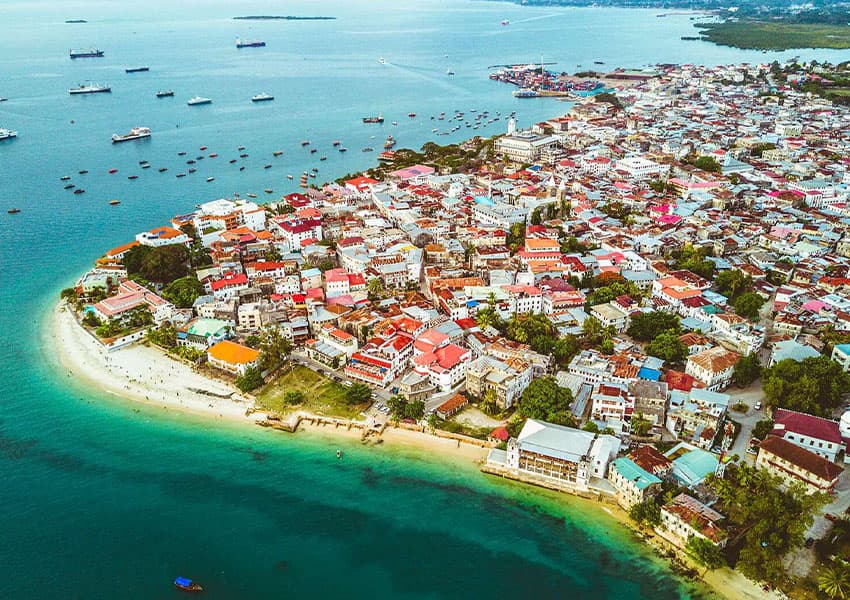
Tanzania’s famous cities are waiting for you to explore. Each city offers a mix of adventure, culture, and natural beauty. From the lively streets of Dar es Salaam to the historic charm of Zanzibar City, every place has its own special appeal. Get ready to travel to Tanzania and discover its top tourist attractions!
Explore top Tanzania destinations:
Each of these cities offers a unique experience, showcasing the culture, history, and natural beauty of Tanzania. Whether you are looking for adventure, relaxation, or cultural exploration, Tanzania’s famous cities have something for everyone. Plan your trip today and discover the wonders of this amazing country!
Tanzania’s tourist highlights are waiting for you to explore in this ultimate Tanzania travel guide. From the stunning wildlife of the Serengeti to the beautiful beaches of Zanzibar, each destination offers a unique experience. With incredible national parks, rich culture, and breathtaking landscapes, Tanzania is a treasure trove of adventures. Whether you are looking for a safari, beach relaxation, or cultural experiences, Tanzania has it all. Let’s dive into the best tourist attractions you should visit when you travel to Tanzania.
Serengeti National Park: The Serengeti is one of the most famous national parks in the world. It is known for the Great Migration, where millions of wildebeest and zebras travel in search of food and water. You can go on a safari to see these amazing animals up close and enjoy the stunning landscapes.
Ngorongoro Crater: The Ngorongoro Crater is a UNESCO World Heritage site and one of Tanzania’s tourist highlights. This massive volcanic caldera is home to diverse wildlife, including lions, elephants, and rhinos. The views from the rim are breathtaking, making it a must-visit location.
Mount Kilimanjaro: Mount Kilimanjaro is Africa’s highest peak and a popular destination for hikers. Many people come to climb this majestic mountain. The journey offers beautiful scenery and a chance to see unique wildlife and plants.
Zanzibar Island: Zanzibar is famous for its white sandy beaches and crystal-clear waters. Stone Town, a UNESCO World Heritage site, is rich in history and culture. You can explore the narrow streets, visit the spice markets, and enjoy delicious seafood.
Tarangire National Park: Tarangire National Park is known for its large elephant herds and stunning baobab trees. It is less crowded than other parks, making it a great place for a peaceful safari. You can see lions, giraffes, and many bird species here.
Lake Manyara National Park: Lake Manyara National Park is famous for its beautiful lake and diverse wildlife. You can see flamingos, hippos, and even tree-climbing lions. The park offers great walking safaris and birdwatching opportunities.
Selous Game Reserve: Selous is one of the largest game reserves in Africa. It is less touristy than other parks, which makes it special. You can take guided walks, boat safaris, and see a variety of animals in their natural habitat.
Ruins of Kilwa Kisiwani: The ruins of Kilwa Kisiwani are a UNESCO World Heritage site. These ancient ruins tell the story of a once-thriving trading city. You can explore the old fort and the beautiful mosque while enjoying views of the ocean.
Mikumi National Park: Mikumi National Park is easily accessible from Dar es Salaam. It offers a chance to see elephants, zebras, and other wildlife. The park is perfect for a short safari trip and is great for families.
Bagamoyo: Bagamoyo is a historic coastal town with beautiful beaches and rich culture. You can learn about its history as a trading port and visit the old ruins. The laid-back atmosphere makes it a nice place to relax.
Gombe Stream National Park: Gombe Stream is famous for its chimpanzee population. You can go on treks to see these amazing primates in the wild. The park also offers beautiful hiking trails along the shores of Lake Tanganyika.
Arusha National Park: Arusha National Park is a hidden gem with stunning landscapes, including Mount Meru. It is great for hiking, and you can see wildlife like giraffes and buffalo. The park is close to the city of Arusha, making it easy to visit.
Set off on your journey to Tanzania and discover its incredible attractions. With a mix of wildlife, stunning landscapes, and rich culture, Tanzania promises an unforgettable travel experience. Use this Tanzania travel guide to help you plan your adventure!
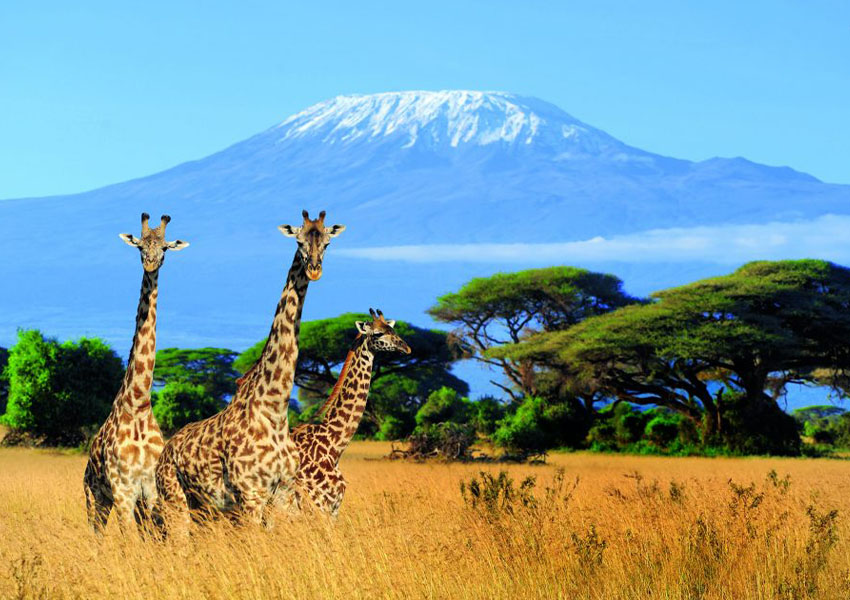
Customize your own holiday! Just tell us what is your need and our experienced travel consultants will suggest you the best trip plan that suits you.
Tanzania is the best destination for wellness and retreats. With its stunning landscapes and calming atmosphere, it is perfect for those seeking relaxation. Many wellness resorts offer yoga, meditation, and spa treatments surrounded by nature.
When you travel to Tanzania for relaxation, you can enjoy beautiful beaches, lush forests, and breathtaking mountains. Places like Zanzibar and the Serengeti provide peaceful settings to unwind. You can also find wellness tours in Tanzania that focus on holistic health, including traditional healing practices.
Moreover, the warm and friendly people enhance your experience, making you feel at home. Whether you want to meditate by the ocean or hike in the mountains, Tanzania has something for everyone. This unique blend of beauty and culture makes it a top choice for wellness seekers.


Tanzania’s customs are important for understanding the culture and connecting with the local people. Each country has its own traditions, shaped by history, religion, and social norms. For travelers wanting to enjoy their time in Tanzania, knowing these customs can enhance their experience. This guide is for those curious about Tanzanian culture and etiquette.
Tanzania is a multi-religious country with a mix of Islam, Christianity, and indigenous beliefs. The majority of the population practices Christianity, especially in the mainland, while Islam is more common in Zanzibar. There are also followers of traditional African religions. The government is a democratic republic, with a president elected every five years. The people of Tanzania value respect and community, which are reflected in their daily lives. When traveling in Tanzania, you might notice the importance of prayer in daily routines, especially among Muslims who pray five times a day. During your visit, you can see beautiful mosques and churches that showcase the country’s rich architectural heritage.
When meeting someone in Tanzania, a friendly greeting is essential. People often say “Jambo” or “Habari” to ask how someone is doing. Handshakes are common, and friends may hug or clap each other’s hands. It is polite to greet everyone in a group, starting with the oldest person. Respect for elders is very important in Tanzanian culture. When visiting homes, it is customary to remove your shoes before entering, showing respect for the household.
In Tanzania, hospitality is a vital part of the culture. Guests are treated with great respect and kindness. It is common for hosts to offer food and drinks, and refusing can be seen as impolite. If you are invited to someone’s home, it is a good idea to bring a small gift, like fruit or sweets, to show appreciation. This practice strengthens bonds and shows respect for the host.
Tanzanian festivals are lively and colorful events that reflect the country’s rich heritage. One of the most important celebrations is “Nguvumali,” which honors the harvest season. People gather to celebrate with music, dance, and traditional foods. “Saba Saba,” or Industry Day, is another significant event that celebrates the importance of agriculture and industry in Tanzania. During this festival, there are parades, exhibitions, and cultural performances. “Zanzibar International Film Festival” showcases local and international films, promoting the arts in Tanzania. These festivals provide a wonderful opportunity to experience Tanzanian culture and meet local people.
Traveling in Tanzania offers a chance to enjoy its beautiful landscapes and warm hospitality. By understanding Tanzania’s customs and etiquette, you can have a more meaningful and enjoyable experience. Use this Tanzania travel guide to help you navigate the rich culture and traditions of this amazing country!
Best Tanzanian cuisines are a delightful mix of flavors, ingredients, and cultural influences. The food reflects the country’s rich heritage and diverse communities. One popular dish is “Ugali,” a staple made from maize flour, often served with vegetables or meat. Another favorite is “Nyama Choma,” which features grilled meat, typically enjoyed at gatherings and celebrations.
Tanzanian culinary traditions focus on sharing meals with family and friends. Eating together is a way to strengthen bonds and show hospitality. Spices like cardamom, cumin, and coriander are commonly used, adding depth to dishes. The combination of sweet and savory flavors is common, showcasing the balance that is important in Tanzanian cooking.
When you travel Tanzania, trying local foods is a must. A food safari in Tanzania allows you to explore various dishes and street food. Don’t miss out on the following best Tanzanian foods:
Ugali: Ugali is a staple food made from maize flour and water. It is cooked to a thick, dough-like consistency and served with various sides like vegetables, meat, or fish. Ugali is a filling dish that accompanies almost every meal, reflecting the simplicity and heartiness of Tanzanian cuisine.
Nyama Choma: Nyama Choma translates to “grilled meat” and is a beloved dish in Tanzania. It typically features marinated beef, goat, or chicken grilled over an open flame. Served with sides like ugali and kachumbari (a fresh tomato and onion salad), it is a popular choice at gatherings and celebrations.
Samosas: Samosas are deep-fried pastries filled with spiced meat or vegetables. They are a popular snack or appetizer in Tanzania, often enjoyed with chutney or hot sauce. The crispy exterior and flavorful filling make them a favorite among locals and visitors alike, perfect for sharing at social events.
Mandazi: Mandazi are sweet, fried doughnuts that are popular for breakfast or as a snack. They are slightly crispy on the outside and soft on the inside, often flavored with coconut or cardamom. Mandazi are commonly enjoyed with tea or coffee, making them a delightful treat throughout the day.
Pilau: Pilau is a fragrant rice dish cooked with spices, meat, and sometimes vegetables. It is often served during special occasions and celebrations. The rice absorbs the rich flavors of spices like cinnamon, cloves, and cumin, making it a delicious and aromatic dish that represents the culinary diversity of Tanzania.
Kachumbari: Kachumbari is a fresh salad made with chopped tomatoes, onions, and chili peppers, often dressed with lemon or lime juice. It adds a refreshing crunch to meals and complements grilled dishes like nyama choma. Kachumbari is a staple side dish that enhances the overall dining experience.
Fish Curry: Fish curry is a popular dish, especially in coastal regions. It features fresh fish cooked in a spicy coconut milk sauce, flavored with garlic, ginger, and various spices. This dish showcases the abundance of seafood in Tanzania and is typically served with rice or ugali.
Chipsi Mayai: Chipsi Mayai is a unique Tanzanian dish that combines French fries and eggs. The fries are mixed with beaten eggs and fried until golden brown. This hearty meal is often enjoyed for breakfast or as a snack, providing a satisfying and filling option for any time of the day.
Mchicha: Mchicha is a traditional Tanzanian dish made from amaranth leaves cooked with ground peanuts or coconut milk. It is often served as a side dish alongside ugali or rice. The dish is nutritious and flavorful, highlighting the use of local vegetables in Tanzanian cuisine.
Biryani: Tanzanian biryani is a flavorful rice dish that incorporates spices, meat, and sometimes potatoes. It is influenced by Indian cuisine and often features a blend of spices such as saffron, cardamom, and cloves. Biryani is usually prepared for special occasions and is enjoyed by many for its rich taste and aroma.
Enjoying the best Tanzanian cuisines is a great way to connect with the people and the land.
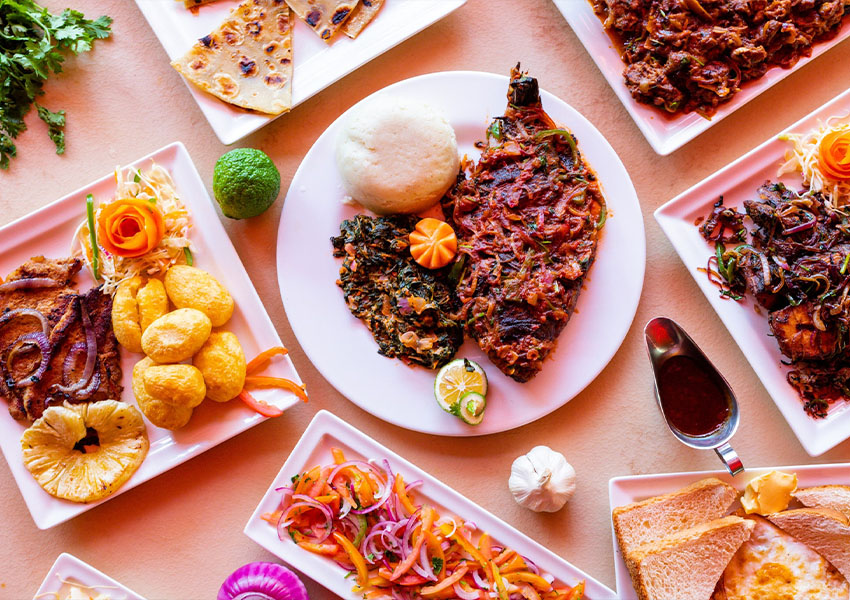
Savor a symphony of flavors that define culinary artistry.
Tanzanian cuisine delights with flavorful spices, delicious grilled meats, and hearty stews.
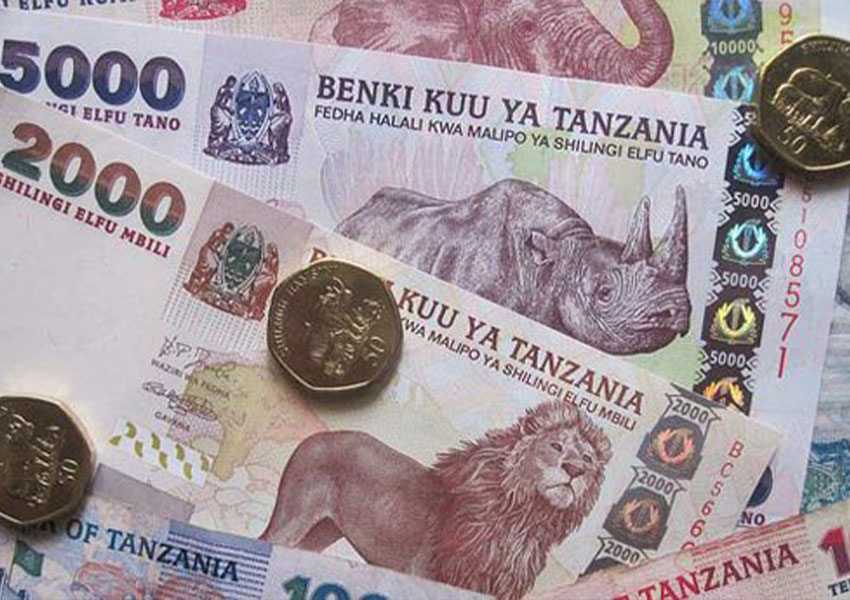
Tanzania’s currency is the Tanzanian Shilling (TZS). When you travel to Tanzania, you will use Shillings for all your purchases. It is important to note that prices are usually displayed in Shillings, so be prepared to handle this currency during your trip. You can check the exchange rate of the Shilling against the US Dollar or Euro at exchange offices or online.
When planning your Tanzania travel guide, remember that credit and debit cards are not widely accepted, especially outside major cities. It is best to bring cash in US Dollars or Euros, as these currencies are easier to exchange. Many places only accept cash, so having enough on hand is a good Tanzania travel tip.
You can exchange your money upon arrival at the airport or at various exchange offices in cities like Dar es Salaam and Arusha. However, be aware that not all exchange offices are open 24 hours. Some hotels also offer currency exchange services at their reception desks.
You can bring foreign currency into Tanzania up to USD 10,000 or its equivalent without declaring it. If you carry more than this amount, you must declare it at customs upon arrival. For local currency, you can bring up to TZS 1,000,000 without declaration. Any amount over this must be deposited at a local bank.
When exporting money, the same limits apply. If you want to take out more than the allowed amount, you need to show proof of your exchange or deposit from when you entered the country. Always keep your receipts for any currency exchanged to avoid issues when leaving Tanzania.
Tanzania dress code is important to understand when visiting the country. While Tanzania is generally relaxed about clothing, modesty is appreciated, especially in rural areas and religious sites. For women, it is best to wear dresses or skirts that cover the knees, along with tops that cover the shoulders. Men should also dress modestly, avoiding shorts and sleeveless shirts in public places.
Choosing light and breathable fabrics is advisable, as Tanzania can be hot and humid. If you plan to visit more conservative areas, having a lightweight scarf or shawl can help cover your shoulders. By respecting the local dress code, you will show cultural sensitivity and enjoy a more pleasant travel experience in Tanzania.
Tanzanian fashion beautifully blends tradition and modernity. From vibrant kanga wraps that reflect local culture to stylish outfits that showcase contemporary trends, Tanzania’s clothing choices celebrate both heritage and modern style.
Tanzanian Traditional Attire: Traditional dress in Tanzania varies by region and tribe. For women, traditional attire often includes a kanga, which is a colorful piece of fabric wrapped around the body. This is usually paired with a matching headscarf. Women may also wear a less formal outfit known as a “leso,” which is similar to the kanga but often used for everyday wear. In some regions, women wear beaded jewelry that highlights local craftsmanship.
Men’s traditional clothing typically consists of a shirt and trousers, often made from colorful fabric. In some cultures, men wear a “kanga” or “kikoi,” which is a wrap-around garment. These outfits not only reflect cultural values but also showcase the pride of Tanzanian heritage.
Modern Dress: While traditional clothing is significant, modern fashion in Tanzania has also grown. In urban areas, women often wear stylish dresses or skirts with blouses, while men opt for casual shirts and trousers. Young people enjoy mixing traditional patterns with modern cuts, creating a unique style that is both fashionable and respectful.
It is important to note that while modern dress is accepted, modesty remains key. Women often wear dresses that cover their knees and tops that cover their shoulders. Men should also choose clothing that is respectful, especially in rural areas.
The mix of traditional and modern dress in Tanzania highlights the country’s rich culture and its openness to global influences. It reflects the people’s pride in their heritage while adapting to contemporary lifestyles.

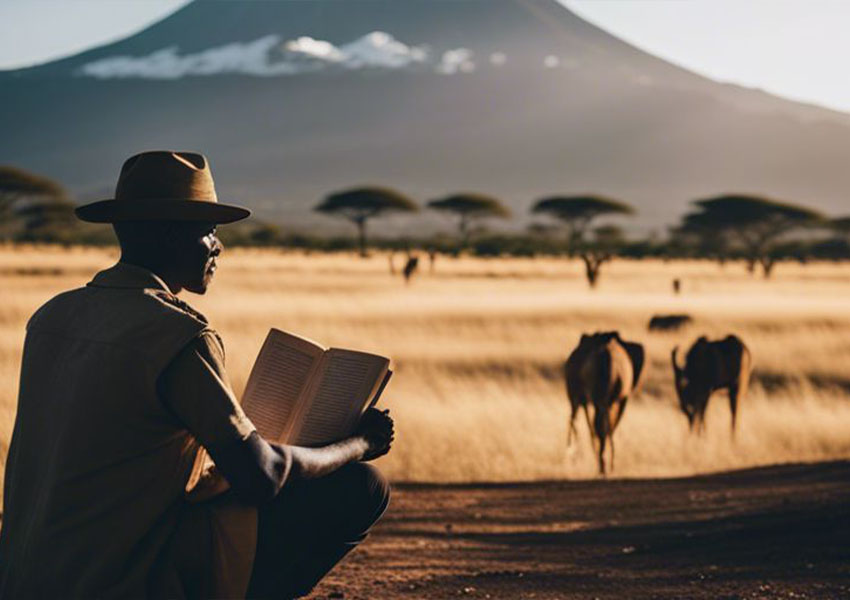
The primary language spoken in Tanzania is Swahili, also known as Kiswahili. Swahili is a Bantu language with a rich history and influences from Arabic, English, and other languages. It is widely used across East Africa and is an important part of Tanzanian culture. The Swahili alphabet consists of 24 letters and is written from left to right.
In recent years, there have been efforts to promote Swahili in education and media, making it more accessible for both locals and visitors. Tanzanians take great pride in their language, which plays a key role in their identity and heritage. Swahili’s expressiveness and its straightforward script reflect Tanzania’s vibrant culture and history.
A
B
D
E
F
G
H
I
J
K
L
M
N
O
P
R
S
T
U
V
W
Y
These letters make up the Swahili alphabet, which is used to write the Swahili language, the main language of Tanzania.
Hello: Habari
Thank you: Asante
Yes: Ndiyo
No: Hapana
Please: Tafadhali
Excuse me: Samahani
Sorry: Pole
Goodbye: Kwa heri
How much is this?: Hii ni pesa ngapi?
Where is…?: …iko wapi?
I don’t understand: Siwezi kuelewa
Help!: Nisaidie!
My name is…: Jina langu ni…
Where is the bathroom?: Choo kiko wapi?
I need a doctor: Nahitaji daktari
I’m lost: Nimepotea
Can you speak English?: Unaweza kuzungumza Kiingereza?
Where can I find a taxi?: Nitaweza kupata teksi wapi?
What is this?: Hii ni nini?
Delicious!: Inapendeza!
These phrases will help you navigate and communicate while traveling in Tanzania, enhancing your experience and interactions with the locals. Using Swahili phrases shows respect for the culture and makes your Tanzania tour more enjoyable.
Tanzanian emergency numbers are essential for anyone traveling in the country. Knowing these numbers can help you stay safe and get assistance when needed. In Tanzania, you can find public phones in cities, and using a local SIM card is a good option for making calls. You can buy SIM cards easily at airports or shops.
For any emergency, dialing 112 will connect you to police, fire, and ambulance services. This number is available from both landlines and mobile phones.
These numbers are important for travelers to know. Always keep them handy in case of emergencies. This Tanzania travel guide can help you prepare for your trip and ensure you have a safe experience while exploring this beautiful country.

When you travel to Tanzania, don’t miss trying local dishes like ugali, nyama choma, and samaki. Ugali is a staple food made from maize flour and is often served with meat or vegetables. Nyama choma, which means grilled meat, is popular at barbecues and is usually enjoyed with a side of spicy sauce.
You should also try pilau, a fragrant rice dish cooked with spices and meat. Another favorite is mchicha, a tasty spinach dish that is often served with fish. For dessert, enjoy mandazi, a sweet fried dough that is perfect with tea.
These dishes reflect the rich culture of Tanzania and will make your trip even more memorable. Be sure to explore local markets and restaurants to experience the best of Tanzanian cuisine!
Traveling to Tanzania is generally safe, but like any country, it is important to take basic precautions and stay aware of your surroundings. Most tourists visit without any problems, enjoying the beautiful landscapes and rich culture. However, it is wise to keep informed about local conditions and follow travel advice.
When you travel in Tanzania, always keep your belongings secure and avoid displaying valuable items. Be cautious in crowded places and use trusted transportation options. It’s also a good idea to check for any travel warnings or health advice before your trip.
Overall, Tanzania is a friendly destination with welcoming people. By staying alert and following safety tips, you can have a wonderful experience exploring this amazing country.
Yes, you can explore Tanzania on your own. Many areas, like national parks and beaches, are open for independent travelers. However, hiring a guide can make your trip easier and more enjoyable. A local guide can help you find the best spots and share important information about the culture and wildlife.
Traveling in Tanzania offers many adventures, from climbing Mount Kilimanjaro to relaxing on the beaches of Zanzibar. Whether you are going on a safari or visiting local markets, having a guide can enhance your experience and ensure your safety. So, while you can explore alone, consider getting a guide for a richer travel experience.
When you travel in Tanzania, always keep your belongings secure and avoid displaying valuable items. Be cautious in crowded places and use trusted transportation options. It’s also a good idea to check for any travel warnings or health advice before your trip.
Overall, Tanzania is a friendly destination with welcoming people. By staying alert and following safety tips, you can have a wonderful experience exploring this amazing country.
Swahili is the official language of Tanzania. It is widely spoken across the country and is an important part of Tanzanian culture. English is also used, especially in tourist areas, schools, and businesses. When you travel to Tanzania, knowing some basic Swahili phrases can enhance your experience and help you connect with the locals.
In addition to Swahili and English, there are many other languages spoken by different ethnic groups in Tanzania. This diversity reflects the rich cultural heritage of the country. Whether you are on a safari or visiting a city, understanding the local languages can make your trip more enjoyable.
The best times to visit Tanzania are during the dry seasons, which are from June to October and January to February. During these months, the weather is warm and sunny, making it ideal for wildlife safaris and outdoor activities. You will also find fewer mosquitoes, which is a plus for travelers.
In addition to the dry seasons, the months of July and August are popular for tourists because of the great migration in the Serengeti. This is when millions of wildebeest and zebras move in search of fresh grass and water. It is an amazing sight to see and a highlight for many who travel to Tanzania.
If you prefer fewer crowds, consider visiting in late February or early March. The weather is still good, and you can enjoy the beautiful landscapes and wildlife without the busy tourist season. Overall, planning your trip during these times will help you make the most of your Tanzania travel experience.
Send your question to us and our Australian travel experts will answer you ASP.
Travel Tanzania and discover a country rich with natural wonders, breathtaking landscapes, vibrant cities, and unique culture. Explore the wildlife of Serengeti National Park, relax on the shores of Zanzibar, and see landmarks like the majestic Mount Kilimanjaro. The variety of attractions makes it an essential destination for visitors from all over the world.
Subscribe to see secret deals prices drop the moment you sign up!